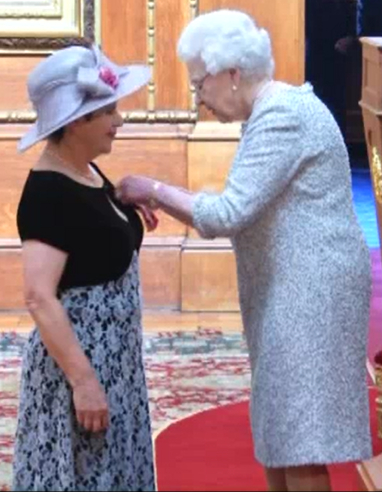
In my last post, I commented on the first strand of “recent, interesting research” which Penny Ur addressed at the 2023 IATEFL conference. She’s seen above getting a medal from someone who knows even less about SLA research than she does.
Here, I comment on two more strands, drawing again on Leo Sellivan’s report.

The Use of the L1
The research paper Ur referred to (de la Fuente & Goldenberg, 2022) is a well-written and well-considered report of a well-designed study, and it confirms the already widely-accepted view that using the L1 is often very helpful. But I doubt many of Ur’s audience needed to be persuaded that judicious use of the L1 is a “good thing”. On the other hand, I bet Ur didn’t point out that the school where the study was carried out is committed to a task-based learning approach (Ur dismisses TBLT as “unproven”), and I bet she didn’t refer to this bit at the end of the paper either:
An important question, and one that this study did not seek to address, is which types of L1 use (by students, by instructors) and which specific functions had a bigger impact on learning. In other words, what within the +L1 condition (principled approach to L1 use) accounts for the significant gains in learning? (de la Fuente & Goldenberg, 2022, p. 960).
Surely this is what needs discussion. The types of L1 use that work best depend too much on context for research to uncover any reliable, universal patterns. Consequently, we’re talking here about what Long (2015) calls a “pedagogic procedure”, and, as I argued recently in an exchange of views with Phillip Kerr, research into the efficacy of different pedagogic procedures should be carried out by groups of teachers who share the same context. (Ahem: teachers should be paid for this work, and the results should feed into, and hopefully improve, local teaching practice.)

Oral corrective feedback
Now this is a very, very important part of what teachers do.
Ur began by citing Lyster and Randa’s (1997) seminal study, “which showed that recast was the most common oral error correction technique used by teachers, but the least effective one”. That’s not a very accurate summary, but anyway, we’ll let it go and focus on the Big Question: Is it better to provide immediate correction, using relatively unobtrusive procedures such as recasts, or to provide more detailed correction after the task has been completed?
Ur cited studies by Li (2017) and Harmer, P. (2015) which concluded that learners prefer to be corrected at the moment they make the mistake. Ur then cited Fu and Li’s (2022) study, which claims the superiority of immediate corrective feedback. “The authors recommend correcting errors immediately after the first exposure to a new language item in order to rectify errors before they are proceduralized in the learner’s interlanguage”.
according to Sellivan, Ur said no more on the matter.

Discussion
In Long’s TBLT, oral corrective feedback is a vital part of the subservient but important role that explicit teaching plays. It’s a key component of “focus on form”, which is Long’s unfortunate name for his counter to a grammar approach that is based on a “focus on forms”. Long says that the best way to help students learn an L2 is to involve them in tasks where they “learn by doing”. However, since adults are, in Long’s opinion (an opinion which relies on Nick Ellis’ theory of SLA) “partially disabled” language learners, they benefit from a certain type of explicit instruction and intervention by teachers, and recasts are a key component. The gap – chasm! – between Ur’s and Long’s views on oral correction is hard to exaggerate.
Needless to say, Ur’s perfunctory treatment of “recent, interesting research” into oral corrective feedback gave the audience no insight into its significance, and nothing to chew on. In contrast, Leo Selivan went away, looked up the references, read the articles, thought about the issues, and made some interesting comments in his review. Good for him! But who else in the audience did anything similar? Leo could have emailed Ur and got the suggested reading list in 2 minutes, and the rest of the 2,000+ audience could have done something much better with the time they spent listening to Penny Ur smugly sharing her reading list.
The Fu and Li (2022) paper is worth discussion. It’s an excellent report of a study exploring the differential effects of immediate and delayed corrective feedback on the acquisition of the English past tense by 145 seventh-grade EFL students at a private school in Eastern China. The study is in, IMHO, extremely well-designed, well-reported and well-discussed. It includes discussion of two conflicting SLA theories: Long’s Interaction Hypothesis (Long, 2015), and Skill Acquisition Theory (Lyster, 2004). Long’s Interaction Hypothesis claims that feedback in the form of prompts such as recasts are ideal “because they withhold the correct form and encourage self-repairs according to which the optimal time to address linguistic problems is through critical feedback (CF) during negotiated interaction” (Fu & Lu, 2022, p.4). On the other hand, Skill Acquisition Theory (Lyster, 2004) emphasises the importance of feedback in “activating and proceduralizing the declarative knowledge which has been presented in the first stage of the teaching”.
Obviously, the two theories contradict each other, but there’s some convergence when it comes to the timing of corrective oral feedback. The Interaction Hypothesis insists that immediate feedback is superior, while Skill Acquisition Theory suggests that feedback can be provided during tasks performed immediately after explicit instruction, or postponed until a later time after learners complete some communicative practice. Given the authors’ and the school’s preference for TBLT, there was no explicit instruction phase prior to performance of the communicative task, and the study found that there was a marked advantage for unobtrusive, immediate critical feedback, including recasts. But the question of whether Long’s interaction hypothesis is a better explanation of L2 learning that skills acquisition theory remains. At least one of the two theories is wrong, and teachers would surely benefit from information about their relative merits and support from research findings. Furthermore, there are still scholars, including Rod Ellis and Peter Skehan & Pauline Foster, who argue for the importance of delayed, post-task feedback.

Conclusion
Penny Ur’s 2023 IATEFL talk was a waste of time, typical of what you get at conferences where the organisers blindly rely on “Big Names”. On the other hand, Leo Selivan’s blog post contributes much: he reports on the talk and gives us his considered view of the issues that Ur glided over.